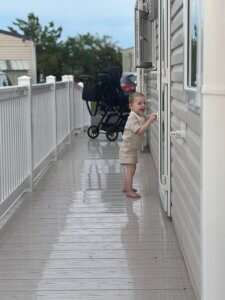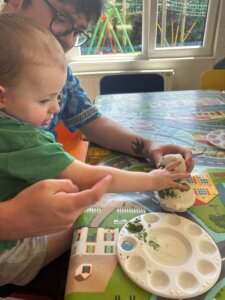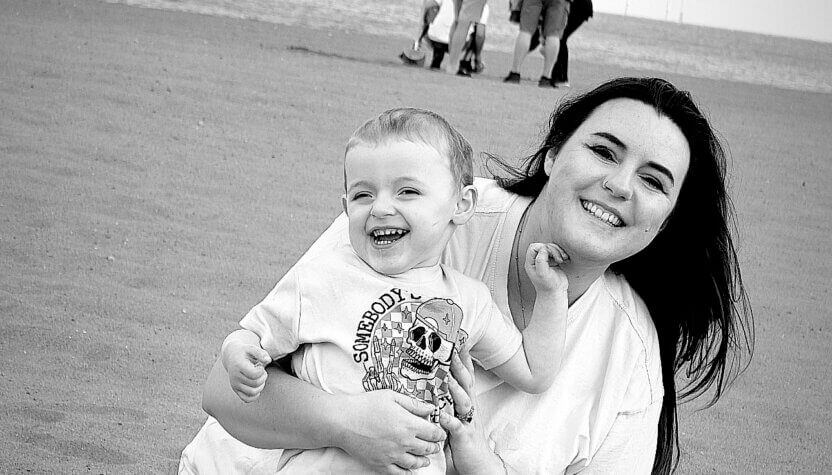Paige Newell-White knows all too well the emotional and physical stress of caring for a child with a rare genetic condition. Her son Archie, three, is a fun-loving, Hot Wheels collecting, smiley little boy who loves nothing more than splashing in a swimming pool. But at the age of 17 months he was diagnosed with Angelman Syndrome, a rare genetic condition. Paige describes the process of battling to get a diagnosis, coping with his care and the ensuing emotional strain as a ‘grieving process’.
“The diagnostic process takes you through all the stages of grief,” Paige explains. “I first took him to the GP when he was six months old, he wasn’t sitting up and he wanted to sleep all the time. He was in and out of hospital with repeated infections, caused by aspirating on liquids. I was just put down as an over-anxious first-time mum. Archie wasn’t seen by a paediatrician until he was one. By this time, he was the size of a child half his age and had dropped off the weight charts. He was only just trying to roll over and not reaching for things. He also suffered from absence seizures.”
Paige and husband Connor White, both 27 and from County Durham, were worried sick and it was a battle to get the paediatric referral.
The paediatrician said Archie had global developmental delay and low muscle tone down his left side. After genetic testing, Archie was diagnosed with Angelman Syndrome (AS), a very rare genetic condition which affects the nervous system. It is caused by a change or deletion in the UBE3A gene located on chromosome 15. Children can experience seizures, global developmental delays, speech delays and mobility issues.
genetic condition which affects the nervous system. It is caused by a change or deletion in the UBE3A gene located on chromosome 15. Children can experience seizures, global developmental delays, speech delays and mobility issues.
Paige says: “I’d prepared myself for something bad to come back from the tests, but the way we were told was quite hard – we were told he had AS and given some leaflets. It was a huge shock.”
Archie’s gene deletion is small, below the average, which means with physical therapy his development has progressed since his diagnosis. But his epilepsy has become life threatening.
“In January 2025, we nearly lost him when he had seven prolonged seizures in 12 hours,” Paige explains. “We knew his epilepsy would get worse, we were prepared, but that doesn’t make it easier to cope with. Now Archie is three he has many additional needs: he crawls at home, but he can’t walk and so we use a wheelchair or pushchair outside. He can’t swallow liquids as he will aspirate them, so foods must be thickened. He has bad separation anxiety and will scream if he can’t touch me if I’m in the same room. If he can’t see me, he’s fine.
“He is non-verbal, but he can still communicate his needs. His behaviour can be difficult, and he bites me, he also has sensory issues and can’t stand anything on his face. We are waiting for eye surgery for an eye condition called nystagmus, but so far, we’ve waited two years. He doesn’t sleep – he can go a whole week on one hour’s sleep, so we take the night in shifts. He has no sense of danger and must be supervised 24/7. With a ‘normal’ toddler you can nip to the toilet, but not with Archie, you have to have eyes on him all the time. It’s too much for the Grandparents to look after him, they worry about the seizures, but that means we don’t get a break.”
surgery for an eye condition called nystagmus, but so far, we’ve waited two years. He doesn’t sleep – he can go a whole week on one hour’s sleep, so we take the night in shifts. He has no sense of danger and must be supervised 24/7. With a ‘normal’ toddler you can nip to the toilet, but not with Archie, you have to have eyes on him all the time. It’s too much for the Grandparents to look after him, they worry about the seizures, but that means we don’t get a break.”
Paige adds: “I struggled for a long time; I got severely depressed. I spent a lot of the last year angry and hurt. I had to leave my job as a support worker with adults with learning disabilities in October 2024, as it was just too much to cope with. Friends have been supportive, and private therapy has helped. Thankfully our Council funded that. I’m lucky Connor works from home as an IT engineer, so he’s there if I’m struggling, and we have a childminder for one day a week, but we don’t get much time together as a couple.
“Emotionally it’s like a grieving process. When I was pregnant, I imagined what type of person he’d be, what kind of job he would do. Now I worry will he ever walk? How will he manage at school?”
Holidays have their own challenges when caring for a child with a rare genetic condition. Last year the family went to Berwick-Upon-Tweed but had to return home early as Archie was ill, and with his history of seizures they couldn’t risk being an hour’s drive from the nearest children’s A&E hospital in Edinburgh.
In 2025 the couple applied to stay at the Sandcastle Trust’s fully adapted holiday caravan in Skegness, which is part of ‘Sandcastle Memories’, the charity’s programme offering respite days out and away breaks for families living with a rare genetic condition.
 Paige says: “We had a fantastic holiday in June, it helped us as a family massively. It gave us a chance to slow down and spend quality time together. Looking after a child with a genetic condition is a financial strain too and this year we just wouldn’t have been able to afford a holiday. Being away, it was great to have a break from hospital and physio appointments as we have up to eight appointments a week at home and they’re exhausting.
Paige says: “We had a fantastic holiday in June, it helped us as a family massively. It gave us a chance to slow down and spend quality time together. Looking after a child with a genetic condition is a financial strain too and this year we just wouldn’t have been able to afford a holiday. Being away, it was great to have a break from hospital and physio appointments as we have up to eight appointments a week at home and they’re exhausting.
“The caravan was safe for Archie, there was nothing he could hurt himself on, which meant that we could spend time together there properly relaxing. The design of the caravan meant that Archie could play and wherever he was he could still be watched.
“We enjoyed a few days out, including the Aquarium, did pottery, painting and spent a lot of time swimming – he is water obsessed – and he also loved the wet room bathroom. We all loved the family time together.”








